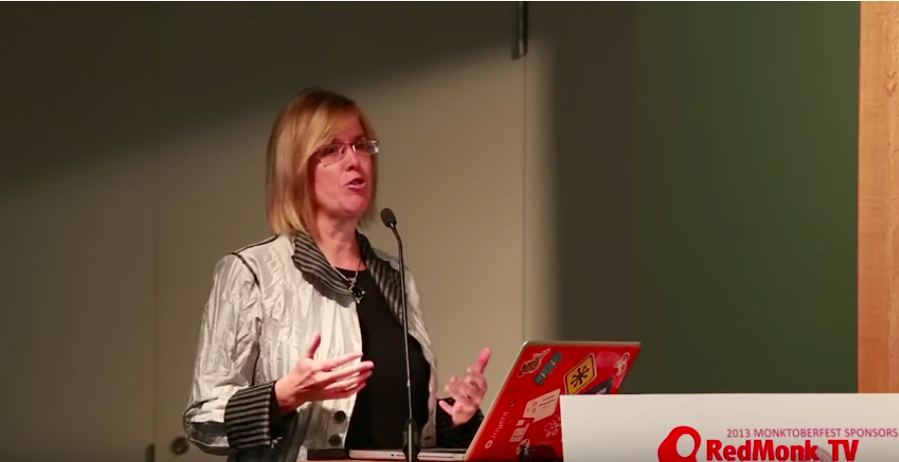This post was originally drafted in March 2015, don’t know why I never published it then. I was undergoing chemo at the time so I probably simply forgot about it.
Since I returned to the US to work and live in 2007, I have attended many highly technical events for each of my employers. At most I was present to run a camera, social media, or the event itself, so my knowledge of the technologies being discussed was not at issue. But I was becoming a recognized expert on social media and technology marketing, and began speaking at conferences (tech and non-) on those topics.
My employers did not always have clear policies about what conference travel they would pay for. Usually, if it was a related tech industry event, my expenses would be covered without demur. Sometimes I felt that I’d be stretching a point, and did not ask.
Then came Monktoberfest. Though the 2013 edition was only its third, Monktoberfest and its sister event, Monki Gras (in London), were already well-regarded events that combined unusual, thought-provoking tech talks with… really good beer. By all reports, it was a great combination, and my then-employer’s founder/CTO Jason Hoffman as well as our VP of Engineering had spoken at Monki Gras the year before.
I was thrilled when my talk was accepted, and assumed the company would follow its usual policy of paying for employees to represent the company at tech events. Portland, Maine, was a long trip from SF, but the company had funded three of us to speak at FISL in Brazil the previous year.
I followed the newly-established policy of asking the CEO’s permission before booking travel. His reply to my email request cc’d the VP of Marketing for his opinion: “Is this useful to the company?” VP didn’t think so. Both were relatively new to the company, and neither had heard of Monktoberfest, which at that moment did not have its website completed with sponsor names etc., so perhaps looked a bit sketchy to them. I explained that this was the sister of the event that our execs had spoken at the year before, was well-regarded, etc. The more I pressed, the more they resisted. Maybe there was some softer, more “womanly” way I could have asked, but… why should I have to? I was, as is my style, laying out facts. Their final answer was “no.”
I was stunned. Though the company was trying to rein in costs, many other staff were still traveling widely to give talks, with no question that those trips would be paid for. Although my talk was “non-technical,” it was hard to understand how the execs could call it an exception.
I chose to pay my own way, and never regretted it. I heard some great talks, met many great people, and my own talk was very well received – so much that I ended up giving a new version of it at OSCON the following year.
Ironically, when Monktoberfest took place in October 2013, Jason Hoffman had just left the company, and everyone at the conference wanted to ask me about that. So there I was, fielding tricky questions and defending the company’s interests on behalf of a management team I was not feeling any warm fuzzies towards.
I was not surprised that the same VP of marketing who had not wanted to pay for my travel nonetheless included my triumph in an internal email about company PR wins – PR is PR, no matter how you get it! The company Twitter account had even retweeted one of the many tweets about my talk. I was congratulated by some fellow employees (which stung a bit, under the circumstances). But no one offered to reimburse my travel even now that my talk had proved to be useful to the company after all.
A few weeks later, our Marketing department put out an internal newsletter with photos and links about four or five talks various employees had recently given (it was conference season). All except mine. I was furious and devastated. The marketing colleague who put together the newsletter excused this as an oversight, which no doubt it was, but… really? REALLY? For what it’s worth, all other the speakers mentioned were male (and had had their conference travel paid for).
It seemed a final statement on how little my contributions to the company were valued. I ended up leaving Joyent as soon as I could thereafter, and went on to give conference talks all over the world for companies that valued me more.




